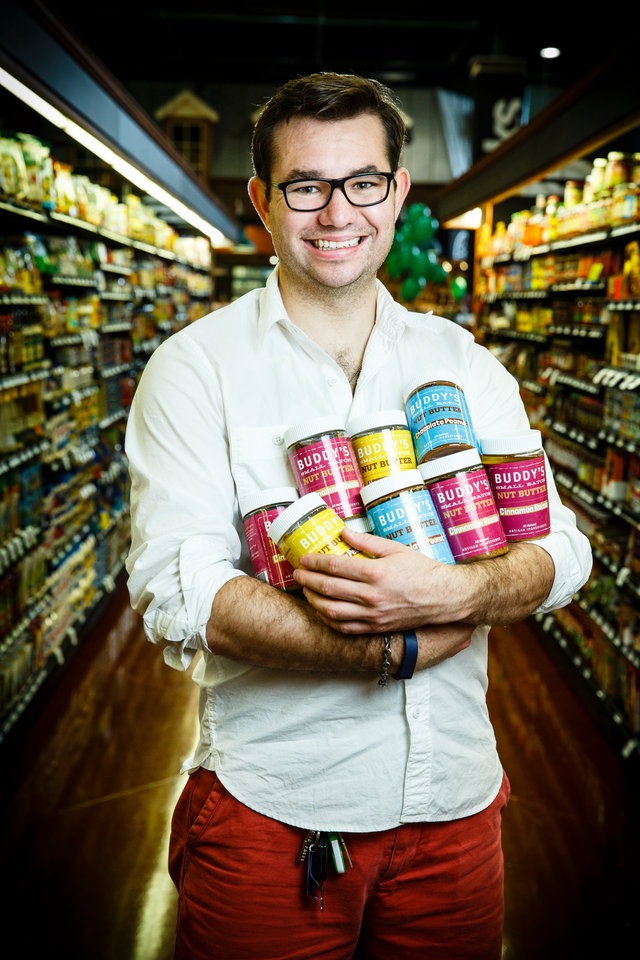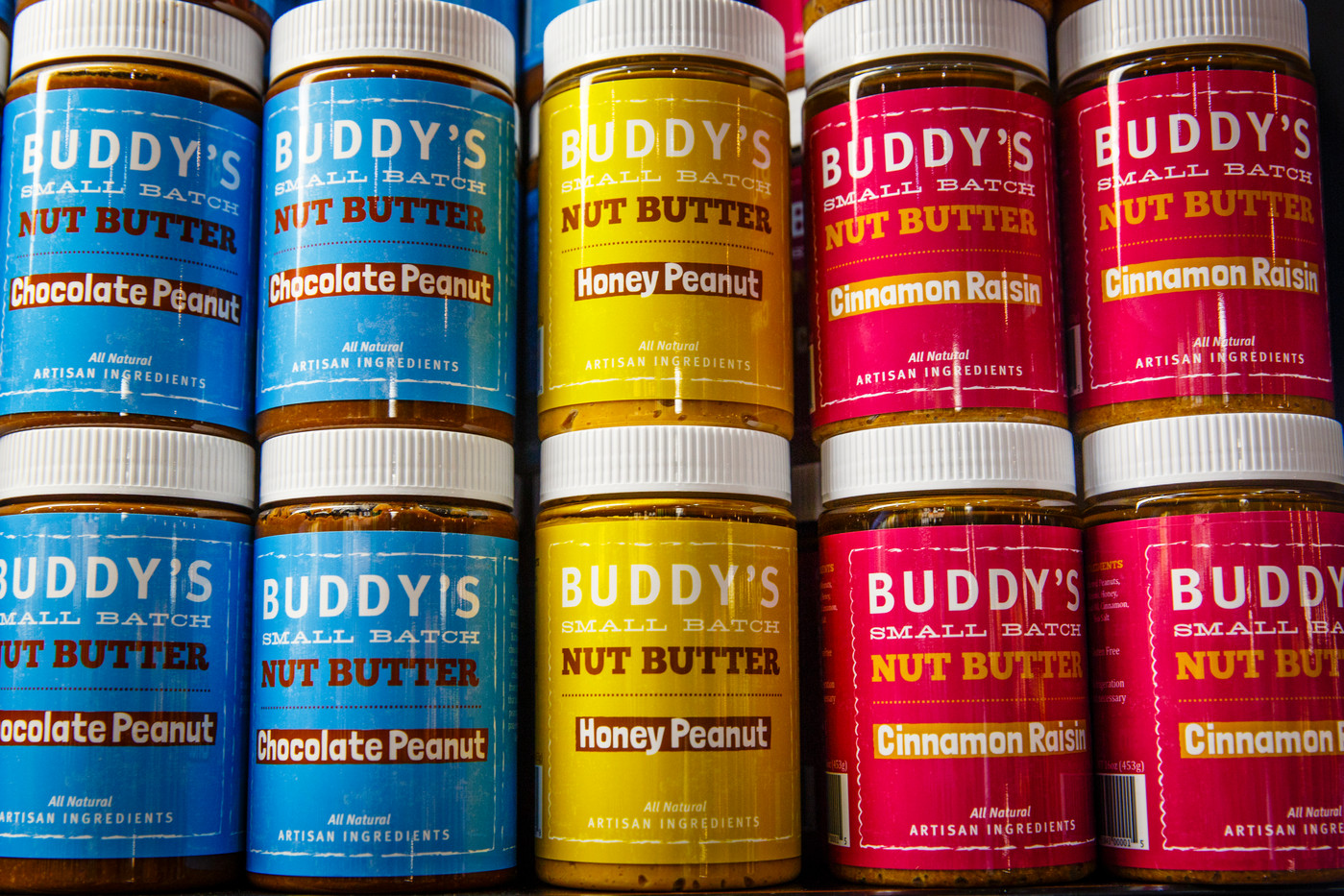“I was 16 when I decided, ‘I’m going to be an entrepreneur someday. This is for me,’” said Andrew Kincheloe ’12, founder and president of Buddy’s Small Batch Nut Butters.
After a year and a half in business, Buddy’s is in 300 stores across five Midwestern states. Kincheloe plans to expand to 400 stores and reach $250K in revenue by the end of this year.
“It’s so exciting to look back at what’s happened to get here,” he said from the bright, exposed-brick office space he shares with two others in an eclectic warehouse in northeast Minneapolis.
Born to innovate
Although he’s just 25, Kincheloe waited a long time – nearly a decade – to make his dream of owning a business happen.
His passion was sparked by an invigorating stint in his high school’s business club, during which he learned about small-business operations, and an after-school job at his hometown fireworks store in Green Bay, Wisconsin.

Andrew Kincheloe '12
“I loved that job. They paid me well, gave me a lot of responsibility and treated me like family,” Kincheloe said. “I almost bought that store with my dad, but I didn’t want to live in Green Bay the rest of my life. Plus, with fireworks being such a seasonal business, it can get tough.”
By the time Kincheloe arrived at the University of St. Thomas, he was more than eager to take entrepreneurial classes and develop the skill set he’d need to negotiate the more nail-biting aspects of owning one’s own business. He’d already waited over a year to start his education, and as everyone knows, a year in teen time is equivalent to an eternity in adult years.
His first college lesson would be one in patience, as entrepreneurship majors at St. Thomas do not begin entrepreneurship classes until their sophomore year. But once immersed in the program, the tough realities of life as an entrepreneur dawned on him, quelling his initial fire to start his own business right away. During his senior year, he decided to first pursue the traditional post-graduation route and get a 9-5 corporate job.
“I was going through tons of interviews because in my mind that was just what I had to do … get a job with a Fortune 500 company,” Kincheloe said. “I figured I wanted to be a manager. I just didn’t want to sit behind a desk all day.”
But after interviews with large companies, including Target, Unilever, Apple and Wal-Mart, didn’t result in a job offer, he sought advice from St. Thomas entrepreneurship professor Alec Johnson, who was teaching Kincheloe’s capstone course.
“Life was rushing by my last semester. I’m running track. I’m only taking three classes but I have my capstone and I’m running to all these interviews, making the final rounds and I’m asking myself, ‘Why am I not getting the job? What’s the deal?’” Kincheloe remembered.
Johnson told him, simply, that he had to be an entrepreneur.
“Are you kidding? I’m only 22. I have no money and no experience. How can I do this?” Kincheloe responded.
“You have what it takes. You’ll figure it out,” Johnson volleyed back.
So he kept it simple and figured it out, though it wasn’t easy. He suspended his job search and instead took a job as a clerk at a liquor store just to make some income. A friend let Kincheloe crash in his living room his first two months out of St. Thomas.
“It was very pick-yourself-up-by-the-bootstraps. At the time my friends are getting jobs, they’re comfortable. And I had no idea what I was doing,” he said. “In the beginning it was kind of fun. But once fall came and I had expenses and my rent was the most it had ever been, it started to get tough.”
At that point Kincheloe took a job at Chipotle and began writing his business plan for Buddy’s, which involved research, developing flavors, experimenting with ingredients and focusing on branding.
Now that all is said and done, Johnson isn't surprised by Kincheloe's determination and success. "Andrew embodies the St. Thomas entrepreneur," he said. "He found something that he loves, that matters to him. He then set out to build a company that captured those values. It can't be understated that his love for cooking, dedication to a healthy product and general values are significant factors in his success. He gives us all reason to believe that we too can create a career from a dream."
Peanut butter: the natural choice
His choice to make peanut butter the focal point of his small business was a no-brainer. “My fascination for peanut butter started when I was a kid. I was a really picky eater. I wouldn’t even eat hamburgers or potatoes unless they were French fries, but peanut butter was huge. I ate peanut butter toast for breakfast almost every day and I’d have half a peanut butter sandwich for lunch because I didn’t like anything they served at school,” Kincheloe said.
Thanks to his paternal grandmother, an avid cook, who moved to Green Bay when he was in middle school, and, in part, the London Business Semester, during which he “quadrupled” his love of good food, Kincheloe broadened his palate. So much that he “would eat a live octopus if you gave it me," he admitted with straight-faced conviction.
Bringing the conversation back to traditionally palatable food, he added, “You could say Buddy’s perfectly combines my passion for entrepreneurship with my love for food."
After just five months, Kincheloe acquired funding based on his solid but simple vision: to make “fresh, artisan peanut butter that tastes good, contains simple ingredients and is offered at a great price every day.” He also settled on three flavors: honey peanut (his favorite sandwich pairing since childhood), cinnamon raisin and chocolate peanut, all of which he was ready to take from paper to kitchen.

Kincheloe hands out samples at the Kowalski's Market in Woodbury.
For the first year Kincheloe and three employees made the peanut butter themselves in a food studio he leased on Chicago Avenue in Minneapolis, producing 600 jars of peanut butter per week. As Buddy’s grew in popularity Kincheloe and his small team could not keep up with the demand themselves, so his nut butters now are produced by a local manufacturer, though still in small batches. Consequently, he now spends about 30 hours a week at his office. With an Xbox within arms’ reach and a Twins game playing silently on an enormous flat-screen TV beside his work station, it’s hardly the standard-issue desk job he always has run from.
“I’m in and out a lot, depending on the day, so it’s definitely a small-business environment, which is great,” he said.
A budding future
With sales growing steadily and showing no signs of slowing down, life as a peanut butter entrepreneur may not be getting easier for Kincheloe, but it’s definitely getting more exciting.
“A lot of (bad) days happen, unfortunately,” he said. Recently, for instance, a batch of delayed shipments dictated a good chunk of his time. Just a week later a large order didn't show up at his distributor, even though he'd confirmed it twice. As a result he’ll be fined for having to reschedule. "I'm going to be fielding calls from grocery store managers wanting to know why their shipment of Honey Peanut hasn’t arrived on time," he said, running his hand through his hair.
“There are some things I have no control over,” Kincheloe said. “Like when I lose money or I have a bad month. It kind of sucks. But that’s the name of the game in small business. … Perseverance is the word of the day, every day.
“Don’t get me wrong,” he added. “Buddy’s has been able to achieve a lot of the good stuff too. There's been more good than bad, and it’s exciting to look back at what’s happened to get to where it’s at today.”
Among those achievements is being named a semi-finalist in the Food/Beverage division of the University of Minnesota/Carlson School of Management’s Minnesota Cup, the largest business concept challenge in the United States.
Buddy’s also caught the attention of Food and Wine. The magazine will profile Buddy’s in an upcoming issue. Kincheloe personally delivered his peanut butter to the magazine’s New York office.
Despite his growing success, with 6,000 to 8,000 jars of Buddy's now distributed per week, Kincheloe still strives to put a face to Buddy's – the nickname his mom has called him since he was a little peanut. It's not out of the ordinary to spot Buddy himself at a local retailer handing out samples, often introducing himself as "Buddy."
In 10 years or so, Kincheloe hopes to sell Buddy’s – a common entrepreneurial path once a business proves itself a solid, consistent moneymaker – and open a small café or bistro. “Something small and not stressful,” he said. “But I don’t focus on those dreams now, or I get farfetched. I live today with the end goal in mind because it keeps me busy and focused.”
For now he's more than content to keep his sights on figuring out the brightest future possible for his premier venture.







